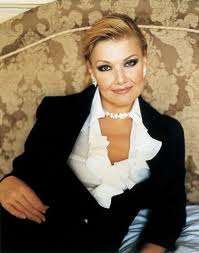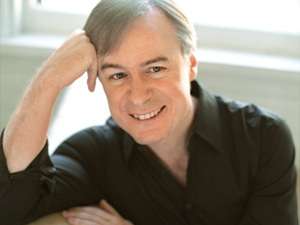|
Back
The Power of Enthusiasm New York
Isaac Stern Auditorium, Carnegie Hall
03/09/2012 -
Claude Debussy: Printemps (orchestrated by Henri Büsser)
Kaija Saariaho: Quatre Instants
Igor Stravinsky: The Firebird (Complete ballet)
Karita Mattila (Soprano)
St. Louis Symphony, David Robertson (Music Director and Conductor)

K. Mattila (© Lauri Eriksson)
When two of music’s most exuberant personalities come together, success is not guaranteed. But conductor David Robertson and soprano Karita Mattila complement such vitality with the singular prowess that insures artistic attainment.
Ergo, when the St. Louis Symphony Music Director jokes to a rehearsal audience “I’m David Robertson and I’ll be your conductor for tonight”, or when he enters with his hands held aloft in triumph, it is no affectation but a sign of his joy. And when Finnish Karita Mattila double-kisses the Concertmaster before beginning, and performs a virtual ballet of emotions during her 18-minute stint, that too represents a personality doing everything to communicate.
Then again, Ms Mattila and composer Kaija Saariaho (who took special delight in the performance) have long cooperated in their endeavors. Ms. Saariaho, who is gracing many a New York concert this week and next, wrote Quatre Instants especially for the soprano, who presents premieres of the work (including Carnegie Hall) worldwide.
And of the three works played last night, this cycle of four songs–turned into a monodrama which could rival Schoenberg’s Erwartung in style–was the most stunning and unexpected work on the program.
Ms. Mattila had requested the work, and Ms. Saariaho had reached out to her longtime collaborator, Lebanese-born historian-poet Amin Maalouf, who supplied the poems, on aspects of love. The images are not promising: a boat sailing away, remorse “devouring” the singer, imagination replacing physical contact, and a reprise to all four. But their composer was aware of the theatrical effect–as well as Ms. Mattila’s innate sense of theatre.
The result wss agonizing and mesmerizing. Ms. Mattila was regal, majestic in her black jeweled gown and black scarf. Her voice was powerful enough to fit the majesty, but soon went onto fierce declarations, mighty leaps, a voluminous cry when singing “Le remords me brûle!” (“The remorse devours me”).
Yet the voice was only one segment of this performance. These were not concert arias, they were supplications. Ms. Mattila used her scarf like Isadora Duncan, thrusting it around her, waving it was she turned and thrusts her body around, never once losing the complex percussive music.
In an evening which promised to be “an enjoyable one”, Quatre Instants was an ecstasy that transcended mere enjoyment. Turning the ephemera of music into (I foresee) an everlasting memory.

D. Robertson (© Michael Tammaro)
Not that the exuberant Mr. Robertson was secondary in the other works. Debussy’s Printemps is rarely played these days, and for good reason. The two themes, bordering on the exotic, are charming. But the orchestration breathes late 19th Century French-German heaviness, far from the later Debussy.
(I am tempted to call this a Saturday Massenet performance, but will resist the bad jeu de mots.)
The last work was Robertson at his most masterful, the complete 45-minute ballet of Firebird. Yes, of course he pulled it off, for the St. Louis Symphony is a grand organization, as honored in their home city as beer and baseball. (Well...er...almost...)
David Robertson added one frill, a brass fanfare from the audience to announce Ivan Tsaravitch, but that wasn’t necessary. Not a second of the 45-minute non-stop ballet was anything but tight, taut and a tribute to Mr. Robertson’s innate enthusiasm.
Harry Rolnick
|